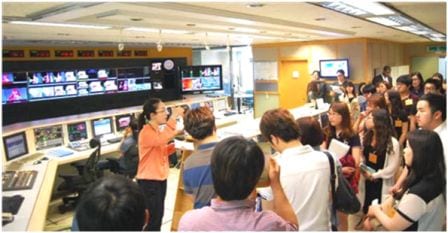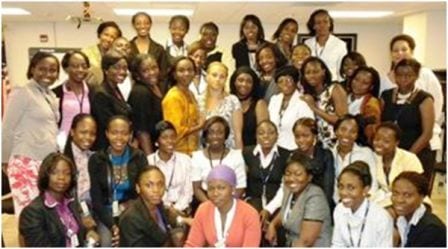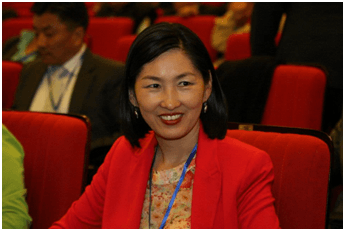
Note: First in a new Take Five blog post series
![]() The Office of U.S. Undersecretary for Public Diplomacy Tara Sonenshine began several months ago to distribute summary PD activity highlights to interested members of the U.S. public. In a series of blog posts starting today, I’d like to showcase some of these highlights, and use them to illustrate key facets of ongoing U.S. public diplomacy work.
The Office of U.S. Undersecretary for Public Diplomacy Tara Sonenshine began several months ago to distribute summary PD activity highlights to interested members of the U.S. public. In a series of blog posts starting today, I’d like to showcase some of these highlights, and use them to illustrate key facets of ongoing U.S. public diplomacy work.
Last year, after diving into the world of public diplomacy scholarship as a Fellow at GWU’s Institute for Public Diplomacy and Global Communication (IPDGC), I began to realize that a frequently missing piece of the academic puzzle is concrete discussion and analysis of what public diplomats actually do in the field. And considering that U.S. public diplomacy remains significantly field-driven, this feels like a major gap. Thus a blog series is born.
Each piece will begin with a few thoughts on what the selected programs and activities have in common, and what is significant about that common theme. The highlights speak for themselves.
Today’s theme is Opinion Leaders. Future topics will include: Not Always Setting the Agenda; Messaging Creatively; Arts Programs as Communication; and more. As always, readers, I welcome your interest, your feedback, and your additional thoughts.
Focus: Opinion Leaders
Over the years, debates have raged within U.S. Public Diplomacy about how much energy and resources to direct towards “opinion leaders” (journalists, professors, artists, political and social movement leaders) and how much towards the broad general public (e.g. via youth outreach.)
Rhetoric in these debates tended to confuse “opinion leaders” and “elites.” Practically no one objected to the idea of going far beyond elites, but most public diplomacy practitioners recognized that opinion leaders come in all shapes, sizes, ages, classes, genders, and income levels. Acutely aware that there were only so many PD dollars to go around, they hesitated to abandon working with opinion leaders (sometimes termed audience multipliers) in order to concentrate on engaging ordinary citizens directly.
Fortunately, among the many benefits of digital technology and social media are two that have helped lay to rest the elites vs. opinion leader debate. First, digital media has expanded the communication power and resources of non-elites to the point where no one any longer can doubt their ability to shape public opinion; and second, digital communication means field diplomats can now reach the general public (in a more interactive and targeted way than broadcasting allows) with much less expenditure of funds and time resources.
The following recent State Department highlights are selected to showcase the variety of ways that U.S. public diplomacy continues to work with opinion leaders — journalists, teachers, professors, NGO leaders, entrepreneurs, and selected youth leaders, and to communicate – through them – with their own respective networks and audiences. (Text from State Department highlights is marked with *)
Journalists are opinion leaders par excellence.
 * VOA Program Connects US and Pakistan: Viewers in Pakistan can now experience a slice of life in America, with the premiere of a dynamic new VOA program called “Sana, A Pakistani,” that follows show host Sana Mirza — one of Pakistan’s most popular television newscasters — as she gets to know this country. “I just moved here, so I’m seeing things with fresh eyes,” says Sana. “I want the program to a picture of what life is really like in the United States.” The first program focused on Washington D.C. and included a visit to a mosque, the White House, and an aid organization that provides free meals to the homeless. Sana says she plans to travel around the country so she can show viewers how people really live, including the many Pakistani-Americans that have moved to the United States.
* VOA Program Connects US and Pakistan: Viewers in Pakistan can now experience a slice of life in America, with the premiere of a dynamic new VOA program called “Sana, A Pakistani,” that follows show host Sana Mirza — one of Pakistan’s most popular television newscasters — as she gets to know this country. “I just moved here, so I’m seeing things with fresh eyes,” says Sana. “I want the program to a picture of what life is really like in the United States.” The first program focused on Washington D.C. and included a visit to a mosque, the White House, and an aid organization that provides free meals to the homeless. Sana says she plans to travel around the country so she can show viewers how people really live, including the many Pakistani-Americans that have moved to the United States.
* Alumna’s Recognition Marks Fulbright’s 20th Anniversary in Vietnam: July’s State Alumni Member of the Month is Do Minh Thuy, a Fulbright Program alumna from Vietnam dedicated to raising the professional and ethical standards of Vietnamese journalism. The honor coincided with Fulbright’s 20th anniversary in Vietnam.
 * Embassy Seoul Hosts Student Journalism Seminar: In a first-ever collaboration with the Korea
* Embassy Seoul Hosts Student Journalism Seminar: In a first-ever collaboration with the Korea
Association of International Educators (KAIE), Embassy Seoul arranged the 2012 Student Journalism Seminar, inviting 34 top student journalists from 17 university newspapers and broadcasting stations across eight cities in Korea. Under the theme of “Journalism and the Changing Media Environment,” participants enjoyed remarks from U.S. Ambassador Sung Kim, journalism workshops, visits to major media outlets, and meetings with U.S. and Korean journalists.
 * Partnering with VOA in South Sudan: Voice of America’s (VOA) South Sudan Project held a reporting training workshop in Juba, South Sudan for 19 journalists, including reporters from VOA’s radio program, South Sudan in Focus, as well as reporters and announcers from the Voice of the People, Radio Miraya, and South Sudan Radio.
* Partnering with VOA in South Sudan: Voice of America’s (VOA) South Sudan Project held a reporting training workshop in Juba, South Sudan for 19 journalists, including reporters from VOA’s radio program, South Sudan in Focus, as well as reporters and announcers from the Voice of the People, Radio Miraya, and South Sudan Radio.
* IIP’s eLibraryUSA Wows Influential Ghana TV Station: The Accra Information Resource Center (IRC) hosted staff from one of Ghana’s most influential TV stations; showing them how to locate documentaries and books, podcasts, videos, articles and reference sources via the collection of 30 commercial databases available to audiences worldwide. Following the two hour session, TV3’s lead producer said they would extend training invitations to the most prominent people in Ghana’s media landscape.
But media influence is no longer just the domain of journalists.
* Libyan Civil Society Organizations Produce First Public Service Announcements: Four civil society organizations from the cities of Misrata, Tripoli, and Sebha completed technical training in video production and public messaging with a grant from the State Department’s Middle East Partnership Initiative (MEPI). The organizations produced twelve public service announcements (PSAs) on electoral education, voter participation, rule of law, and mine risk awareness.
People listen to business leaders too (even those not profiled in major newspapers!)
*Russian Business Leader Credits FLEX Year in the United States for Success: Leading Russian businesswoman Marina Malykhina was featured in a July 27 article in The Moscow Times, where she attributed much of her success to the entrepreneurial values learned as a teenager on ECA’s Future Leaders Exchange (FLEX) Program. Malykhina is the cofounder and CEO of one of Russia’s largest market research firms.
 * Fortune Alum Pays it Forward with Mentoring Challenge in Nigeria: Consulate General Lagos partnered with Idea Builders Initiative, a non-governmental organization run by an alumna of the Fortune/State Department Mentoring program, to conduct a three-day orientation and training program for 35 young women. These 35 women accepted a “Mentoring Challenge” to reach out to 100 female students in area high schools over the next 12 months. They learned about public speaking, confidence building, goal setting, conflict resolution, money and time management, career planning, and handling peer pressure.
* Fortune Alum Pays it Forward with Mentoring Challenge in Nigeria: Consulate General Lagos partnered with Idea Builders Initiative, a non-governmental organization run by an alumna of the Fortune/State Department Mentoring program, to conduct a three-day orientation and training program for 35 young women. These 35 women accepted a “Mentoring Challenge” to reach out to 100 female students in area high schools over the next 12 months. They learned about public speaking, confidence building, goal setting, conflict resolution, money and time management, career planning, and handling peer pressure.
* Coca-Cola Scholars: The State Department’s Bureau of Near East / North African Affairs hosted 100 young leaders from the region on July 13 to mark the completion of their month-long entrepreneurship education program sponsored by the State Department and the Coca-Cola Company in partnership with the Kelley School of Business at Indiana University (IU.) The young leaders showcased community-based initiative proposals they developed during their program at IU. Under Secretary Sonenshine and White House Deputy National Security Advisor for Strategic Communications Ben Rhodes addressed the scholars and NEA Spokesperson Aaron Snipe took extensive questions from the group.
All posts aspire to engage future government and political leaders:
* ECA Alumni To Play Key Role in Yemen Transition: Yemen’s President Abdo Rabbu Mansour Hadi has appointed five ECA alumni (from International Visitor Leadership Program and Fulbright) to serve on the Preparatory Committee for the National Dialogue. Committee outcomes will set the stage for the anticipated constitution-drafting process.
 * First Mongolian Fulbrighter Joins Parliament: Oyungerel Tsedevdamba, a Fulbright and Eisenhower program alumna and a board member of the Embassy Alumni Association, was recently elected to the Mongolian parliament. She is the first Fulbright and the third Eisenhower alumna to become a Mongolian parliament member. She is one of only nine women parliamentarians serving alongside 67 men.
* First Mongolian Fulbrighter Joins Parliament: Oyungerel Tsedevdamba, a Fulbright and Eisenhower program alumna and a board member of the Embassy Alumni Association, was recently elected to the Mongolian parliament. She is the first Fulbright and the third Eisenhower alumna to become a Mongolian parliament member. She is one of only nine women parliamentarians serving alongside 67 men.
At the local government level, ensuring that at least one or two people know the U.S. can have a big impact:
* International Visitor Leadership Program (IVLP) Transforms Iraqi Views of Muslim Life in America: A member of the Anbar (Iraq) Provincial Council shared his views of Muslim life in America, after participating in the “Transparency in Federal, State, and Local Government” IVLP. He said his colleagues thought it was “impossible to be a Muslim in the United States, since the Americans all hate Muslims and kick them out of the country.” He said, “I immediately corrected my friends’ misunderstanding and told them about the vibrant community of Muslims that I met in Miami. I knew what they were saying was wrong, and I couldn’t stay silent.”
Teachers and scholars spread knowledge and shape opinions for a living.
 * A Record Number of Fulbrighters Prepare for Departure: 180 new Fulbright Masters and PhD scholars from every province in Pakistan, the largest group of Pakistani Fulbrighters ever, prepared in June / July to head off for universities throughout the United States.
* A Record Number of Fulbrighters Prepare for Departure: 180 new Fulbright Masters and PhD scholars from every province in Pakistan, the largest group of Pakistani Fulbrighters ever, prepared in June / July to head off for universities throughout the United States.
Exchange and public affairs reach current and future influential Americans too:
* ECA Teacher Alumnus Is Connecticut Teacher of the Year: ECA’s Teaching Excellence and Achievement (TEA) alumnus David Bosso was honored by President Obama as the 2012 Connecticut State Teacher of the Year for his passion for learning and teaching about the world. The TEA program provides outstanding secondary school teachers of English as a Foreign Language (EFL), social studies, math and science with unique opportunities to develop expertise in their subject areas. One student wrote: “Mr. Bosso has taken what he has learned from classrooms across the globe and shared his insights with us. When he learns something new, so do we.”
* USUN Panel on Media in a Changing World: Nearly 100 [U.S.] students interning at news outlets in New York City came to the U.S. Mission to the United Nations (USUN) on July 23 to discuss “Media in a Changing World” with peers and media veterans. The program began with a panel, moderated by Deputy Spokesperson Kurtis Cooper, featuring Richard Roth of CNN, Marcelle Hopkins of Al-Jazeera, Sylvan Solloway from the New York University Curtis Institute of Journalism, and Koda Mike Wang of the Huffington Post. The convergence of media and tech, social media, changing business models for news outlets, and many other aspects of covering international affairs were part of a lively discussion.

